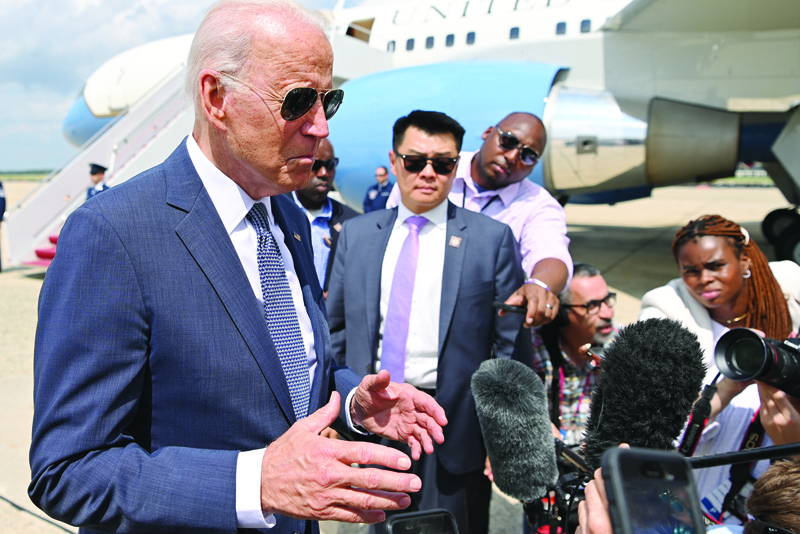 ANDREWS AIR FORCE BASE, US: US President Joe Biden speaks to the press as he makes his way to board Air Force One before departing from Andrews Air Force Base in Maryland Friday. - AFP
ANDREWS AIR FORCE BASE, US: US President Joe Biden speaks to the press as he makes his way to board Air Force One before departing from Andrews Air Force Base in Maryland Friday. - AFPWASHINGTON: Vowing to reset the economy for the benefit of everyday workers and consumers, President Joe Biden unveiled on Friday a wide-ranging plan to tilt the balance of power away from corporations and towards "the little guy." Biden described the initiative as a shift from what he called Washington's 40-year "experiment of letting giant corporations accumulate more and more power" as he signed an executive order directing changes on everything from the sale of hearing aids to the disclosure of airline baggage fees.
"We have to get back to an economy that grows from the bottom up," he said. The order, which drew strong praise from consumer advocates but a scathing response from some industry lobbying groups, outlines 72 initiatives across the federal government and announces the creation of the White House Competition Council to monitor progress.
A White House fact sheet cited earlier moments in US history when presidents confronted corporate power, such as the trust busting push by President Theodore Roosevelt in the early 20th century that gave "the little guy a fighting chance." The move comes as Biden's legislative agenda faces challenges in a closely-divided Congress. The Democratic president has scored some Republican support for a scaled-down infrastructure package, but his other initiatives have failed to garner their support.
Big Tech targeted
Executive orders provide another policy mechanism for presidents, although, unlike legislation, they can be reversed by a successor's pen and have less weight than laws. Achieving the policy's goal of lowering drug prices, or improving small farmers' hands in negotiating with meat processors, will take extensive action from other government bodies and may require years to materialize, experts said.
"It is a blueprint for what this administration hopes to accomplish on competition. It remains to be seen how much of this can actually be done," said Daniel Crane, a professor at the University of Michigan Law School specializing in antitrust law. Among the measures, the order calls for greater scrutiny of mergers involving large tech companies, including so-called "killer acquisitions" that are meant to remove a competitive threat.
The plan also orders the Federal Trade Commission to establish rules on the surveillance and accumulation of data at tech firms and to ensure small businesses are given a better chance to compete with large companies that own and operate online retail marketplaces. The White House also reversed former president Donald Trump's actions on net neutrality, requiring internet providers to allow access to all services in an effort to boost competition among broadband providers.
The measures follow Biden's appointment of prominent Big Tech critics, including Tim Wu at the White House's National Economic Council and Lina Khan as head of the Federal Trade Commission. Other provisions call for the Health and Human Services department to establish rules to allow hearing aids to be sold over the counter and the Department of Transportation to ensure more transparent disclosure of airline baggage fees and other ancillary charges.
The White House also directed US health authorities to work to import prescription drugs from Canada and to increase supply of generic and biosimilar drugs. The policy includes provisions to protect workers from being forced to sign non-compete agreements when starting a new job, which Biden said are used in industries like construction and fast food for "one reason: to keep wages low." "If you're employer wants to keep you, he or she should have to make it worth your while to stay," Biden said.
'False premise'
Zephyr Teachout, a professor at Fordham Law School and an advocate for tough antitrust enforcement, applauded the measure. Biden's announcement "wholly embraces the understanding that concentration of power and market dominance is a central reason for massive inequality," she tweeted. But the Information Technology and Innovation Foundation, a think tank funded in part by large tech companies, said the order is based on a "false premise" and most of it infringed on Congress' duty to legislate. US Chamber of Commerce Executive Vice President Neil Bradley dismissed the policy as "out of touch with reality" and vowed to fight "a government-planned economy." - AFP










